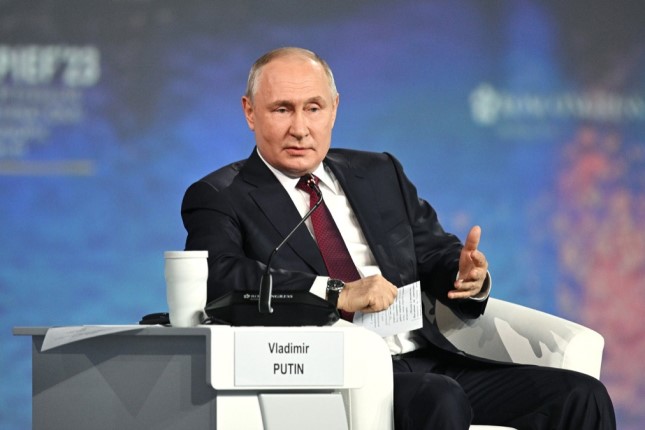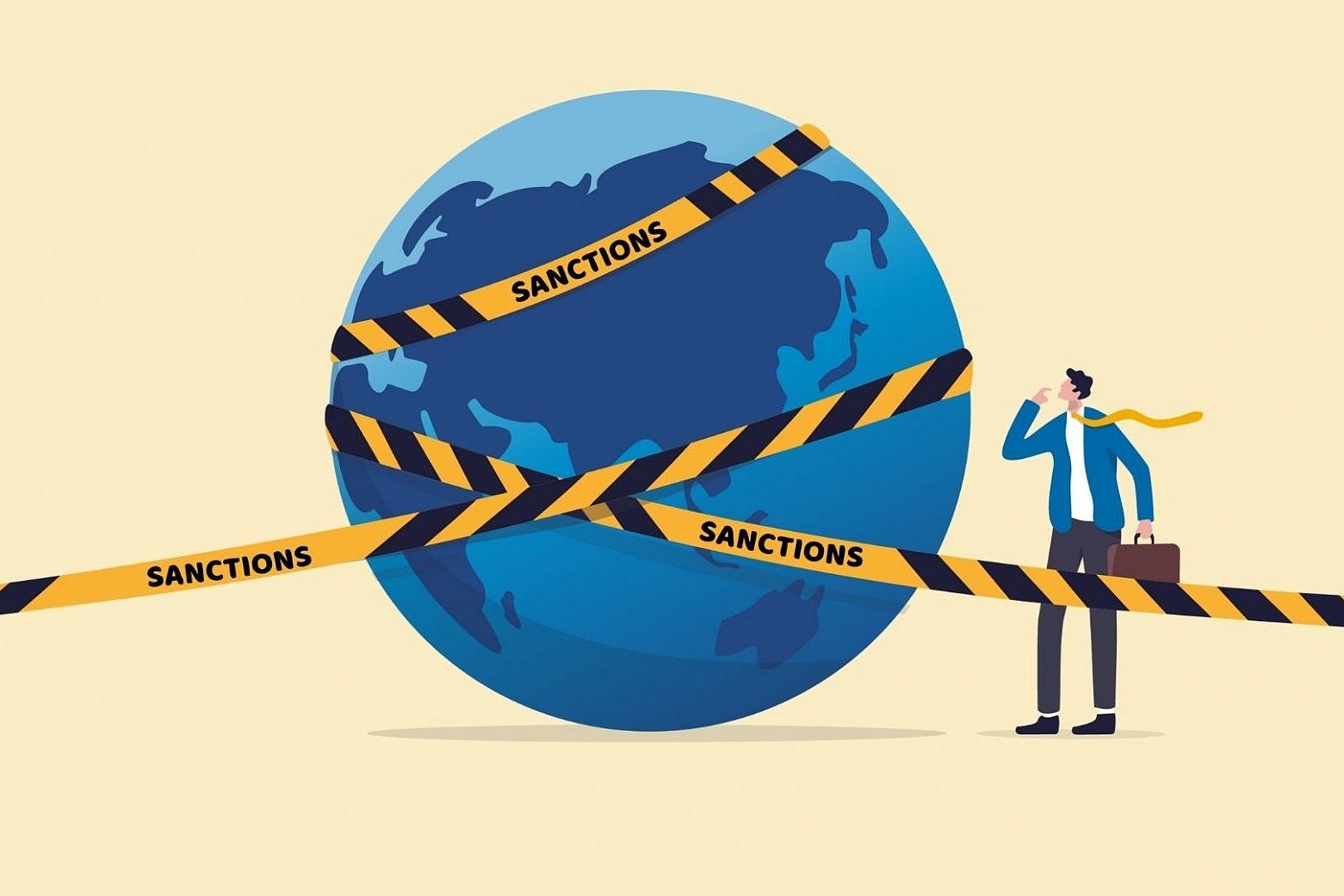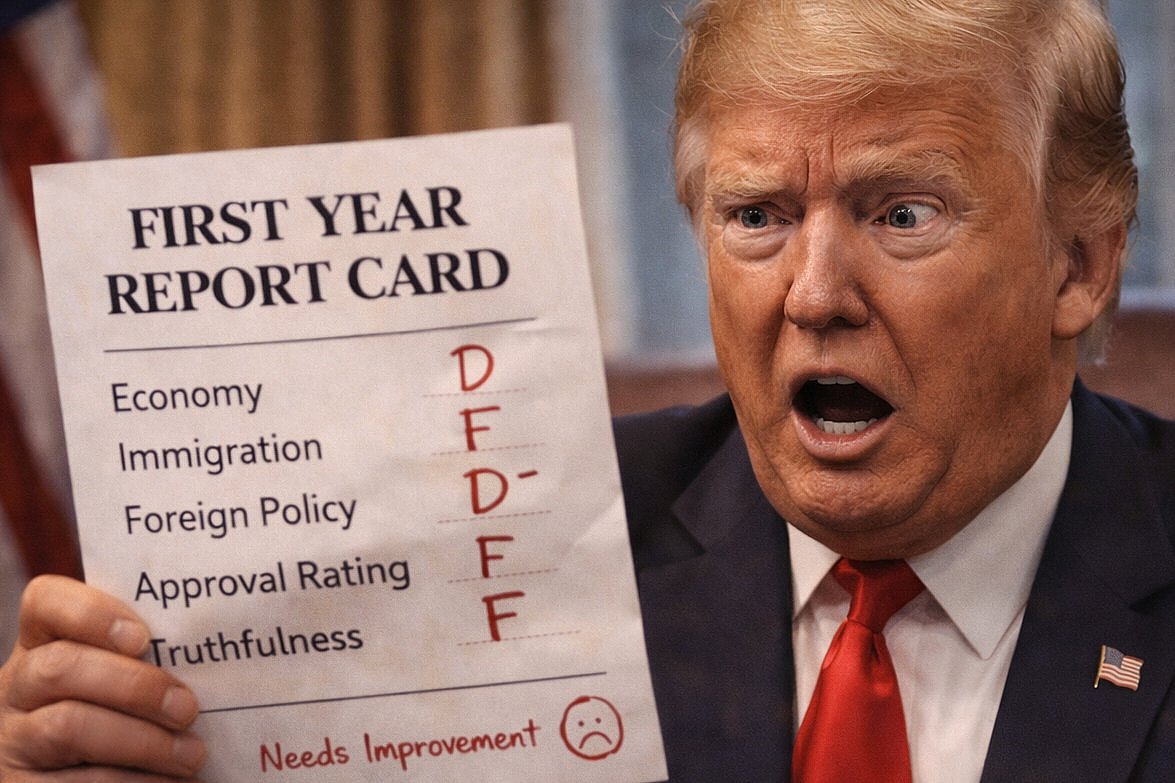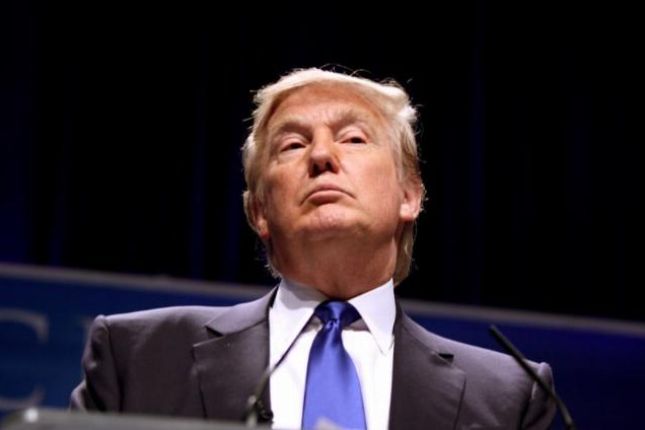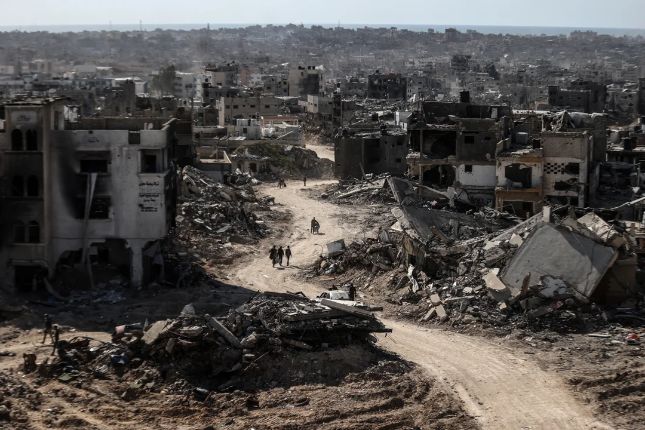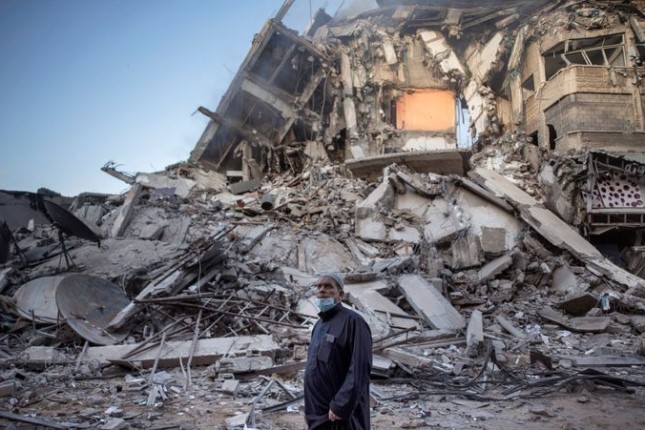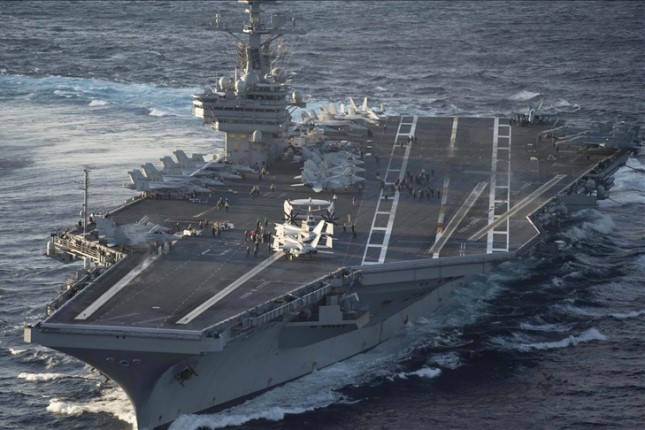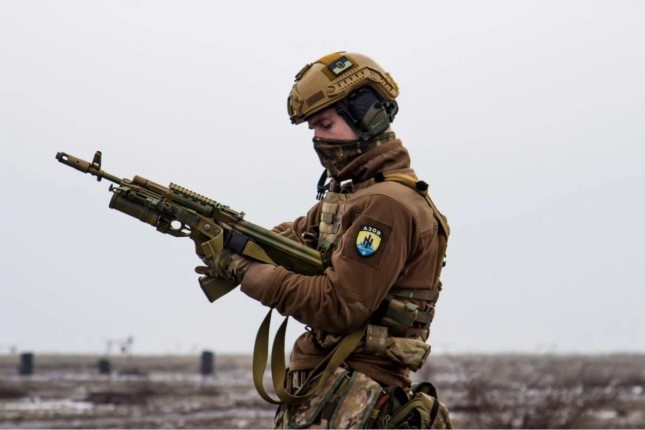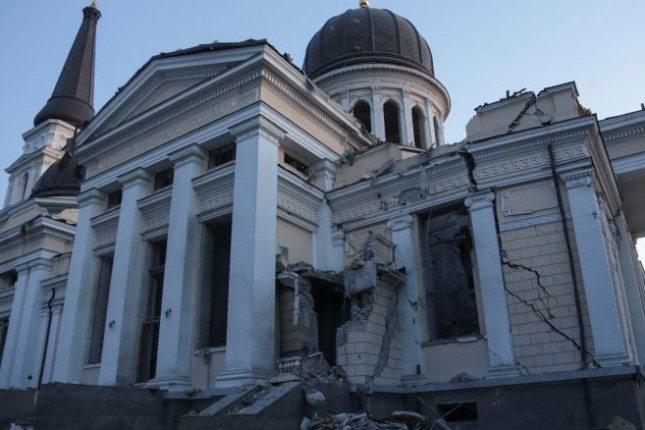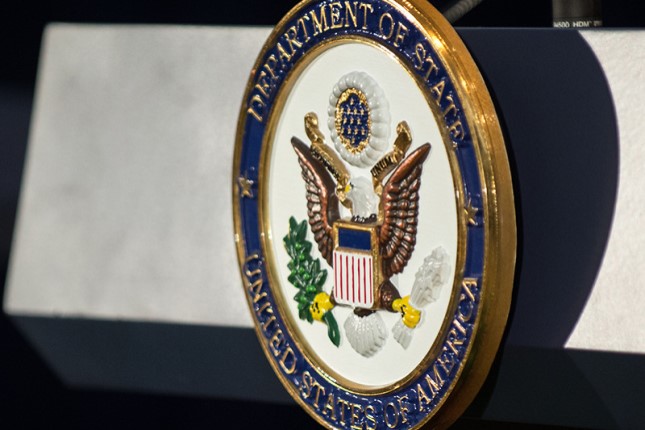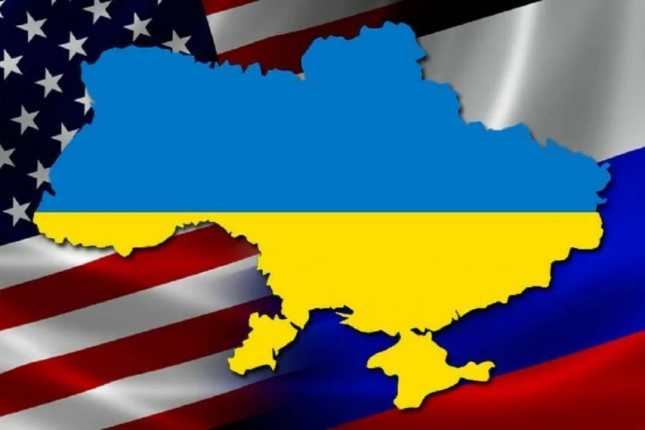Russian President Vladimir Putin is known for a lot of things — his “in your face” speeches, his marathon unscripted press conferences and his stoic impassiveness in the face of adversity come to mind.
One thing that doesn’t jump out at the average observer is his earthy sense of humor. Long-time Putin watchers know that the Russian leader on occasion spices up his formal presentations with off-color quips which, unless one is well versed in colloquial Russian of the back-alley variety, can get missed by the casual listener.
During the June 16 discussion period of the plenary session of the 2023 St. Petersburg International Economic Forum, the Russian leader was asked about his views on the potential use of nuclear weapons in the context of the ongoing Ukrainian conflict.
“This use of nuclear weapons is certainly theoretically possible,” Putin bluntly answered. “For Russia, this is possible if a threat is created to our territorial integrity, independence and sovereignty, the existence of the Russian state. Nuclear weapons are created in order to ensure our security in the broadest sense of the word and the existence of the Russian state.”
Putin’s answer reflected long-standing Russian nuclear doctrine, which postulates the use of nuclear weapons in the case of an existential threat, nuclear or otherwise, to the survival of Russia.
Putin then sought to put the audience at ease. “But we, firstly, do not have such a need,” Putin noted, “and secondly, the very factor of reasoning on this topic already lowers the possibility of lowering the threshold for the use of weapons. This is the first part.”
What came next was classic Putin. “The second is that we have more such weapons [i.e., tactical nuclear weapons] than the NATO countries. They know about it and all the time they persuade us to start talks on reductions.”
Putin paused, before shrugging and, with a half-smile, saying “Khren Im”.
Khren Im is a Russian slang term derived from the word “horseradish” (khren), thus a literal translation of the phrase used by Putin would be “horseradish them.” But khren closely resembles a more salty term used to describe male genitalia, and when used in this manner, khren Im is understood to mean “F*ck them.”
“F*ck them, you know?” Putin said, to the obvious mirth of the audience. “As our people say. Because, in the clumsy terms of economics, this is our competitive advantage.”
The “them” in the horseradish reference made by the Russian president is the United States. Two weeks prior to Putin’s man-in-the-street reaction, on June 2, U.S. President Joe Biden’s national security adviser, Jake Sullivan, addressed a conference hosted by the Arms Control Association, in Washington, D.C. The topic, not surprisingly, was the administration’s approach to U.S.-Russian arms control.
Biden’s Nuclear Strategy
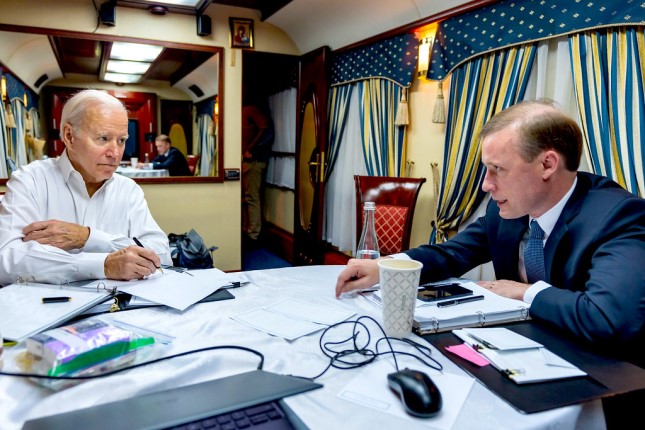
U.S. President Joe Biden with National Security Advisor Jake Sullivan on Feb.19, during the train ride from Przemsyl in Poland to Kiev. Photo: White House / Adam Schultz.
Sullivan made it clear to his audience that the nuclear strategy that the Biden administration approved in October 2022 would remain intact through 2026, when the last remaining U.S.-Russian arms control agreement, the 2010 New START treaty, was set to expire.
Once the New START treaty expires, and barring any agreement replacing it with a new agreement, Sullivan said that, given the state of play between the U.S. and Russia when it came to arms control, the U.S. would have no choice but to develop and deploy newer, more dangerous nuclear weapons.
Sullivan then laid out the Biden administration’s case against Russia, starting with the Russian suspension of the New START treaty itself. Left unsaid was Russia’s stated reason for this suspension, namely the impossibility from the Russian point of view of engaging in strategic nuclear arms reductions at a time when the United States was pursuing a policy in Ukraine of waging a proxy conflict designed to cause the strategic defeat of Russia.
From the Russian perspective, pursuing the cooperative reduction with the U.S. of the very strategic capability which is, by design, intended to prevent Russia’s strategic defeat at a time when the U.S. was pursuing the strategic defeat of Russia was a non-starter.
Likewise left unspoken was Russia’s contention that the U.S. was in violation of the New START Treaty by keeping some 101 strategic delivery systems from being inspected, despite being required to do so by the provisions of the New START Treaty.
Khren Im.
Sullivan called out Russia’s decision to station tactical nuclear weapons in Belarus, without elaborating on either the threats made to Belarus by several NATO members, including Poland and the Baltic states. Nor did he acknowledge that the Russian action parallels a similar U.S. policy in stationing some 100 nuclear B-61 gravity bombs on the territories of five NATO nations.
Khren Im.
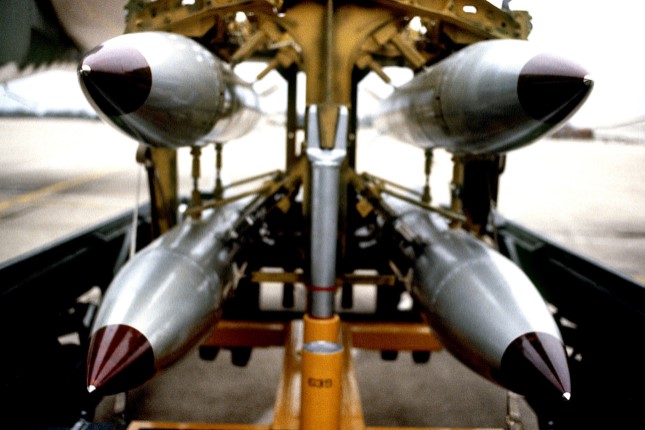
Four nuclear free-fall B61s on a bomb rack at Barksdale Air Force Base, Louisiana, 1986.Photo: DoD, Public domain / Wikimedia Commons.
Sullivan strongly criticized Russia for its total disregard for international law, including arms control treaties such as the Treaty on Conventional Forces in Europe (CFE) from which Russia recently withdrew, without putting the Russian decision in proper historical perspective.
This perspective involves the ongoing disregard by the U.S. and NATO of deliberate inequities in the CFE structure that were brought on by the ongoing expansion of NATO. Nor did the U.S. national security adviser acknowledge that it was the U.S., not Russia, which had withdrawn from the Anti-Ballistic Missile Treaty and the Intermediate Forces Treaty, both of which are considered foundational for all arms control treaties going forward.
Khren Im.
Sullivan’s presentation ignored such salient matters as the purpose behind NATO’s certification of the F-35 fighter as a nuclear-capable delivery system, and what the deployment of nuclear-capable F-35s to NATO nations not included in the existing shared nuclear defense scheme meant to the scope and scale of the NATO nuclear deterrence model considering the continued NATO Baltic Air Policing and South European Air Policing operations.
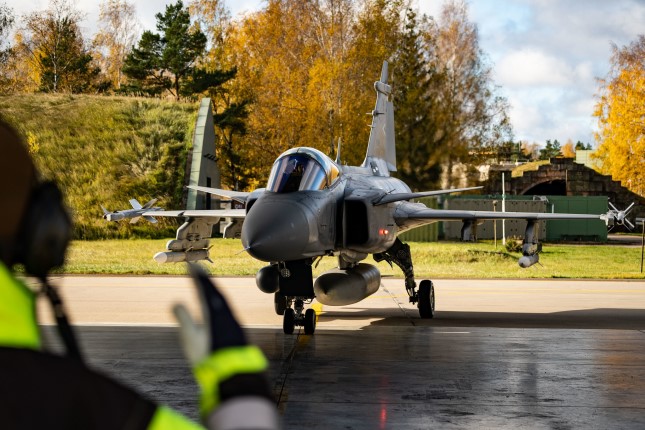
A Hungarian Air Force JAS-39 Gripen is guided into its hangar in October 2022 after a Baltic Air Policing training mission. Photo: NATO / Flickr / CC BY-NC-ND 2.0.
Sullivan also failed to address the current “launch-on-warning” posture employed by the Biden administration, which positions the U.S. to carry out a first nuclear strike against Russia, and the role that the continued patrols in Europe and Asia by American nuclear-capable B-52H strategic bombers, including aggressive flight profiles appearing to simulate the launch of nuclear-armed cruise missiles against Saint Petersburg.
Sullivan also ignored the impact of the Biden administration’s ongoing plans to bring back medium- and intermediate-range nuclear-capable missiles to the European theater will be on the overall nuclear balance of power between the U.S.-NATO and Russia.
Khren Im.
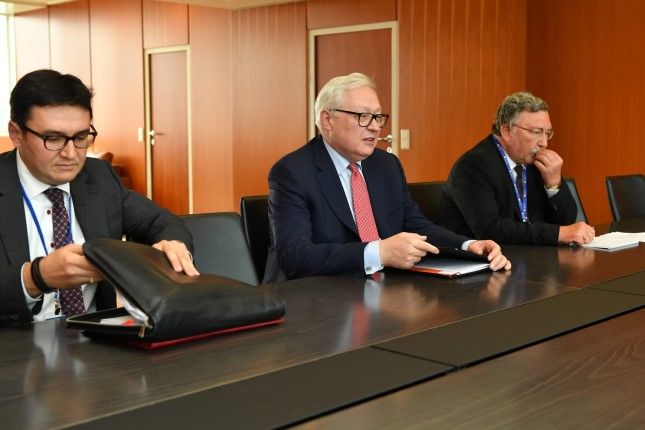
Sergei Ryabkov, Russia’s deputy minister of foreign affairs, center, during a visit to the International Atomic Energy Agency’s Vienna headquarters in August 2020. The IAEA’s director general, Mariano Grossi, on left; Mikhail Ulyanov, Russia’s IAEA representative, on right. Photo: Dean Calma / IAEA / Wikimedia Commons / CC BY 2.0.
A day before Putin addressed the St. Petersburg International Economic Forum, Russian Deputy Foreign Minister Sergey Ryabkov spoke to the media about the “opposing, irreconcilable positions” of Russia and the U.S. concerning the resumption of discussions regarding the New START treaty. “[T]he suspension of New START remains in effect,” Ryabkov said, “and this decision may be revoked or reconsidered only if the U.S. demonstrates a willingness to abandon its fundamentally hostile policy toward the Russian Federation.”
Khren Im.
Neither Putin nor Ryabkov seemed to be concerned about Jake Sullivan’s rhetorical posturing before the Arms Control Association. The same cannot be said for Sergey Karaganov, a noted Russian political scientist, economist and academic. On June 13, Karaganov published an article, “A Difficult but Necessary Decision,” in the journal Russia in Global Affairs. In it, Karaganov praises nuclear weapons as “God’s weapon” and calls for Russia to launch a nuclear strike on “a bunch of targets in a number of countries in order to bring those who have lost their mind to reason.”
Karaganov argues that, in response to the policies of the U.S.-led collective West which seek the strategic defeat of Russia, and because, in his opinion, Russia lacks the conventional military capacity to achieve anything more than a “frozen” conflict in Ukraine that would condemn it to a state of perpetual conflict with Ukraine and the collective West, Russia must “build a strategy of intimidation and deterrence and even use of nuclear weapons” which, if done correctly, would result in “the risk of a ‘retaliatory’ nuclear or any other strike on our territory can be reduced to an absolute minimum.”
“Only a madman,” Karaganov notes, “who, above all, hates America, will have the guts to strike back in ‘defense’ of Europeans, thus putting his own country at risk and sacrificing conditional Boston for conditional Poznan. Both the U.S. and Europe,” Karaganov concludes, “know this very well, but they just prefer not to think about it.”
Biden seems to be leaning toward a similar conclusion. At a fundraiser where he denounced Russia’s decision to station tactical nuclear weapons in Belarus, Biden spoke about his fear that Putin may resort to the use of tactical nuclear weapons.
“When I was out here about two years ago saying I worried about the Colorado river drying up, everybody looked at me like I was crazy,” Biden said. “They looked at me like when I said I worry about Putin using tactical nuclear weapons. It’s real,” Biden concluded.
It’s real.
No kidding, Mr. President. It is as real as it gets. While people are right to be concerned about the policy recommendations made by prominent Russians such as Karaganov, they must also address the root cause of such pronouncements, namely the policies of the Biden administration to achieve the strategic defeat of Russia in Ukraine, seemingly at whatever cost (especially when the cost is paid in the blood of Ukrainian soldiers).
Russia will not use nuclear weapons to fulfil the tasks set forth in its Special Military Operation. It will use nuclear weapons to preserve Russian territorial integrity.
The reality today is, thanks to the irresponsible policies of the U.S. and its NATO allies, who have sought the expansion of NATO up to the Russian borders while foregoing every opportunity to prevent a conflict with Russia over Ukraine, there is a war between Russia and Ukraine that has resulted in Ukraine irrevocably losing 20 percent of its territory (the oblasts of Kherson, Zaparizhia, Donetsk and Lugansk, along with the Crimea).
All of that territory has been absorbed into the Russian Federation and makes any effort to strip them away from Russia by definition an existential conflict where, if Russia were to lose, would necessarily trigger the use of nuclear weapons.
And yet Biden and his NATO allies continue to feed a Ukrainian fantasy where the reacquisition of these territories by Ukraine is a desirable outcome.
Has either Biden, his advisers, or the American public considered the potential consequences of this action? Are they willing to trade Boston for Poznan, or sacrifice humanity for the sake of appeasing Ukrainian sensibilities?
The answer appears to be “no.”
As for Russia, one is guided by the words of Vladimir Putin: “Khren Im”
F*ck them.
But in reality, F*ck us.
All of us.
If this insanity is allowed to continue unabated, it is lights out for all of humanity.
Chew on that the next time you cheer on the Ukrainian counteroffensive or applaud the use of U.S. taxpayer dollars to fund the Ukrainian military.
It is high time for the American public to recognize that our only hope for a survivable future is one where arms control and nuclear disarmament once again serve as the cornerstone of a U.S.-Russian relationship, and that the shortest possible path toward achieving that objective is for Russia to win its war against Ukraine.
And for those politicians in the U.S. and Europe who have invested their political futures on the suicidal mission of feeding Ukraine’s anti-Russian fantasies?
Khren Im.
Main photo: Russian President Vladimir Putin on June 16, during the plenary session of the St. Petersburg International Economic Forum © Ramil Sitdikov / RIA Novosti Host Photo Agency / President of Russia.
Source: Consortium News.
